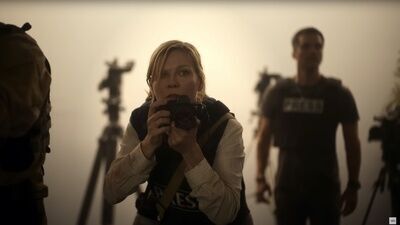Indeed, “Annihilation” comments on feminism by not commenting on it, flipping “Stalker”’s premise by having its protagonists be women, whereas Tarkovsky populated his odyssey with brooding men. Garland doesn’t include a single scene in which skeptical men wonder how these ladies are going to pull off their mission. Lena and her colleagues never have to prove their value—they’re all supremely capable. (In fact, Lena is a former soldier herself.) In the process, Garland compiles a collection of Strong Female Characters who are strong in both senses—vividly rendered but also skilled fighters. And they’re never depicted as simplistic superheroes—they occasionally make mistakes, which sometimes prove fatal, and they understandably freak out at appropriate moments. (The mutant bear scene may be the single scariest film moment of the last 10 years.)
Because Garland and his actors insist on these female protagonists remaining flawed, vulnerable humans, “Annihilation” is that rare mainstream action film to explore deeper issues, such as loss, commitment, acceptance and regret. Garland is as invested in these women’s emotional lives as he is the terrors that await them. They’re not just navigating the Shimmer, they’re each coming to terms with something unresolved in their life, finding closure in the most extraordinary of settings—especially Lena. If we accept the retrograde gender stereotype that insists dudes want movies with spectacle while ladies want movies about feelings, Garland cannily crafted an incredible mutation of the two. How many action flicks are also a haunting examination of marriage and grief?
If the Strong Female Characters of Garland’s first two films—and the accompanying observations on masculinity—avoided being too overt in their commentary, he went wildly in the opposite direction for his follow-up. “With ‘Men,’ I just sort of thought, ‘Screw it, I’m just gonna go straight into this,’” Garland admitted, later adding, “[I]nstead of running underneath, it sits there on the surface.”
As unsubtle as its title and released two years after Garland’s TV series “Devs,” “Men” is an intense, sometimes darkly funny folk-horror film about Harper (Jessie Buckley), a widowed woman who journeys to the English countryside to escape the pain of her husband’s mysterious, shocking death. (We’ll get details about that in flashbacks.) Harper just wants some peace, but she’ll discover that this village is filled with men (all played by Rory Kinnear) who are different degrees of creepy and/or menacing. Alone in a big, secluded house, she becomes fearful of a disturbing naked man looming outside the premises, but even the community’s more seemingly respectable males—including a judgmental priest who insists her husband’s death is her fault—seem to be out to get her.

